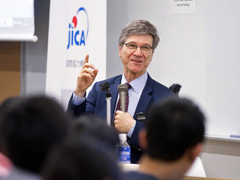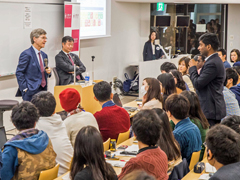What Can We Do to Achieve the SDGs? Discussion with Professor Jeffrey Sachs
2017.12.28
On Nov. 29, 2017, JICA and Sophia University organized a seminar at the university campus with the aim of encouraging the young generation to think and discuss how they can contribute to achieving the Sustainable Development Goals (SDGs), which were adopted by UN in 2015 as global goals.
The seminar featured Professor Jeffery Sachs at Columbia University, who has been at the forefront of international development and cooperation for over 30 years as a prominent economist. He serves as a Special Advisor to the UN Secretary-General on the SDGs and a Director of the UN Sustainable Development Solutions Network. The event attracted a total of 400 participants, including about 300 students and 100 participants from private companies and research institutions.

Professor Jeffery Sachs encouraged the participants to learn about the SDGs and think what they could do
Yoshiaki Terumichi, the President of Sophia University, inaugurated the event expressing his wish that students, who formed a majority of the participants, will take up the challenge of achieving the SDGs as the leaders of the coming generations.
Shinichi Kitaoka, JICA President, took the stage next and told the audience that his partnership with Sachs began with the Millennium Village project, one of the major projects of the Millennium Promise, a non-profit organization founded by Sachs and others in 2005. He noted that this is a crucial time for Japan and the world because the international community has become more and more inward-looking. He said that Japan should share its experiences of development cooperation in the fields of human security, health, education and agriculture among others.
This was followed by Sachs’ lecture in which he referred to Japan’s Meiji Restoration as a successful example of modernization. He praised Japan’s attitude for learning from western economic, political and educational models and making a remarkable transformation to achieve industrialization with maintaining Japan's sovereignty and culture. Sachs used Japan’s modernization as an example to explain the importance of learning from the successes of other countries without slipping into self-complacency, achieving Japan’s sound advancement.
He also pointed out, however, that in reality, wealth and power concentrate with a few large corporations in many countries, the gap between the rich and the poor has been rapidly widening, and the affluence has come at the cost of the environment. He warned that climate change is leading to natural disasters such as floods, droughts and forest fires throughout the world, and explained that this is what led the world, in a very special moment, to adopt the SDGs. He emphasized that we need a politics of the common good that pays attention to the public and environment.

Sachs (top left) and Professor Tsuyoshi Sunohara of Sophia University took questions from the floor
After Sachs’ lecture, a real-time survey on the SDGs was held for the participants, with Tsuyoshi Sunohara, Professor by Special Appointment at Sophia University, as the moderator. After the participants responded to questions, Sachs commented on the results. On a question about whether the participants think that the nationalism, as represented by “America First,” will proliferate in future, 60% of the participants said “yes.” In response to this, Sachs said, “everybody talks to each other even if they don't like each other at all—that is the art of diplomacy and is extraordinarily important because it is the only way to keep peace.” In another question, participants were asked whether Japan should increase its Official Development Assistance (ODA). Most participants said that it should. Sachs, too, pointed out that ODA will be more and more important in the times to come and we should draw more attention to education, especially in poor countries.
This was followed by questions from the audience. Participants asked what initiatives Japan should take to help developing countries achieve the SDGs and what kind of policies are necessary to involve the private sector in the SDGs. In the end, Sachs concluded the discussion with a message for youth, saying that he would like them to learn more about the SDGs and think what action they could take to transform the world.
'Transforming our world' - Part I: A presentation by Jeffrey Sachs (November 29, 2017)
‘Transforming our world' - Part II: Discussion with Jeffrey Sachs (November 29, 2017)
*Audio contains English and Japanese speakers.

事業事前評価表(地球規模課題対応国際科学技術協力(SATREPS)).国際協力機構 地球環境部 . 防災第一チーム. 1.案件名.国 名: フィリピン共和国.

事業事前評価表(地球規模課題対応国際科学技術協力(SATREPS)).国際協力機構 地球環境部 . 防災第一チーム. 1.案件名.国 名: フィリピン共和国.

事業事前評価表(地球規模課題対応国際科学技術協力(SATREPS)).国際協力機構 地球環境部 . 防災第一チーム. 1.案件名.国 名: フィリピン共和国.

事業事前評価表(地球規模課題対応国際科学技術協力(SATREPS)).国際協力機構 地球環境部 . 防災第一チーム. 1.案件名.国 名: フィリピン共和国.

事業事前評価表(地球規模課題対応国際科学技術協力(SATREPS)).国際協力機構 地球環境部 . 防災第一チーム. 1.案件名.国 名: フィリピン共和国.
scroll